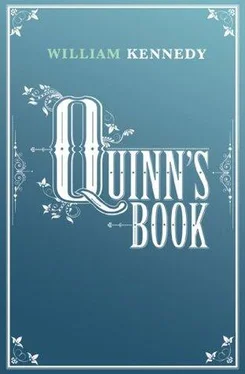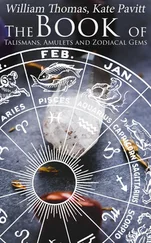I cuffed Joey and flung his weapon away from him, pulled him by the arm off the battlefield in the general direction of the mansion, and we left all Ryans and Palmers behind us. The Ryans, after several retreats, regroupings, and two hours of blood, finally routed the Palmers. Alfie Palmer survived to become the half-blind cripple of Arbor Hill, spent four years in jail after confessing the murder of Toddy Ryan, and lived out his remaining days as drunken beggar and infamous martyr to the unfathomable rhythms of rage.
Newspapers reported on the battle, calling it a feud between Papists and Americans, between the Irish and the Know-Nothings (who numbered in their political ranks the enraged nativists and assorted hybrid-haters bent on shaping a balance in this republic of equals by expelling the unequals). Will Canaday, in a departure from reasonableness, noted that a number of probable deaths, and an unmeasurable maiming of heads, had been effected in the battle, and he concluded: “It is not enough. Let them keep at it until there are no more of their heads to be broken.” Will’s view was widely shared, for it had been brought home to us all that the mob at fury’s peak has no politics, no ethnic allegiance, no religion, but is a rabid beast with bloody claws, and must be neutralized.
On the Monday after the battle I went with Dirck to hear Lyman Fitzgibbon as he mounted a loading platform on the wharf of his foundry and delivered his gospel to the work force at the hour of high noon. He announced he would sustain the cost of repairing Alfie Palmer’s bones but would otherwise leave the fool to his fate; that he would, with great heart, give moral and financial support to the widow and children of Toddy Ryan; that his foremen would hereafter monitor all comparable battles and would note, for purposes of effecting terminal discharge from foundry employ, the name of any worker involved; that he would write his will to encourage his heirs and assigns to do likewise; that he believed in his soul that we are here on this earth to court peaceful ways in the name of the good Christ, and may those who choose otherwise boil forever in the fluid caldrons of hell.
The silent men, surely not persuaded into pacificity by any such pietisms, began the antcrawl back to their furnaces, boilers, puddles, and moulds to ponder the vagaries of existence. Then, in this peculiar ironbound world under one benevolent God, the making of stoves was resumed, for now and forever, amen.
Lyman held forth later that evening in the drawing room of the Staats mansion, eulogizing Dirck, about whom, he said, he felt a certain guilt, but also recollecting with heartfelt agony the probable stirrings of Petrus in his grave over Dirck’s book and the furor it generated in this city; for he knew Petrus feared that precisely such, as did, would occur: that Dirck would fall victim to the low pursuit of the word and with mischievous results.
Hillegond corrected Lyman, saying Dirck’s pursuits were in no wise low or mischievous, but of a high moral order such as others rarely reach. It is true, she said, that he is peculiar and ill-clad (and she eyed my own attire with disdain); but Dirck was also kindly, courageous, and brilliant, and she was proud of him.
“Yes, of course,” said Lyman. “We are all proud of the boy. Proud, proud, proud. But his father would have loathed the publication of that ruinous book. Didn’t your son know that his father was a founder of The Society?”
Dirck promptly stood and wrote his answer at the inkstand under the portrait of Petrus in his senescence, wrote with unerring speed of quill, after which I, with rounded vowels, read his words to all: “Of course I knew. Masked man who ordered my tongue cut, and also ordered against my murder, was giving obeisance to power of Father’s residual status in The Society.”
“Yes, yes, yes,” said Lyman, addressing his remarks to me. “But I’m suggesting you apologize on behalf of your father for what you wrote. If you do, I myself will resign publicly from The Society on grounds that this once splendid brotherhood’s high moral aim has fallen into low estate, corrupted by latter-day scoundrels.”
Dirck exploded into a furious quilling of counterthrust, then stood beside me and said through the medium of my voice that he considered Lyman “great man, great friend of family and of father, but I will never retract one word, for book cost me eternal voice, and what recanting will return that? Neither apology nor resignation will change Society, an evil needing violent overthrow.” Then Dirck sat down in a swim of silent passion.
Lyman stood and shook his fist at me, saying he could not resign “without history’s awareness that The Society was not always vile, and that all present members are not villainous men.”
Dirck scratched out his reply and I read: “Well enough. Then you put Society in historical niche. Please reveal secret dogmas of yore that have led to crucifying of men and slitting of their gizzards to create pasture for rats. For I do not understand such moral evolution.”
Lyman said that nothing he could say would reveal such progression, and that no matter what he said, “it would not clear the name of Petrus for having founded the local chapter of The Society. The words of Dirck Staats are required for that.”
Dirck, dismissing this remark with a wave of his hand, wrote his conclusion: “Am not dead father’s keeper. Nor yours either.”
The sociality of the evening deteriorated with that remark and before long we took to our beds. All that had passed weighed on my brain, but shining epiphanically through it all was the face of Maud. With her visit to Saratoga approaching within weeks, I knew a decision loomed: one that would also involve my bronze disk, which had been recurring in my dreams. On this burdened and sleepless night the disk’s face spoke to me in a pair of cryptic phrases: “Under the arches of love,” it said, and then “Under the banner of blood,” neither phrase holding intimate meaning for me. Only an intuition persisted that one day I might find the grand significance of this oracular object, as well as how it related to Joey Ryan and his slungshot, to the bumblebees in Maud’s script, to the bleeding wrist of Joshua the fugitive slave, and to the exploding soldier’s melancholy dust. The message emerging from my febrile imagination during these tumultuous days was a single word: “linkage”; and from the moment I was able to read that word I became a man compelled to fuse disparate elements of this life, however improbable the joining, this done in a quest to impose meaning on things whose very existence I could not always verify: a vision, for instance, of a young girl holding a human skull with a sweetly warbling red bird trapped inside, the bird visible through the skull’s eye sockets.
In an earlier day I would have dismissed such a tableau as nightmare. But now I was propelled into an unknown whose dimensions grew ever wider and whose equal in spanning them I knew I was not. But even as I knew this I knew also I might never be their equal, and that remaining as I was, out of deference or timidity, would keep me ever distant from Maud. My life would then, I knew, fall into desuetude, like the lives of so many men of my father’s generation, men who moved through their days sustained only by fragments of failed dreams, and who grew either indolent in despair or bellicose in resentment at such a condition.
And so, on a morning not long after the peaking of these pressures, I rode in silence with Will Canaday and Dirck to the Chronicle-Paddle , and when I saw the pair of them together in editorial conference beside the woodstove, I summoned the courage to present them with my decision, saying, “If you please, sirs, I think I must resign from this job and leave Albany.” They regarded me with silent surprise.
Читать дальше












